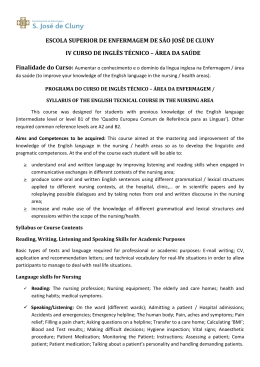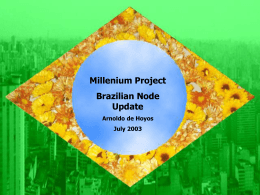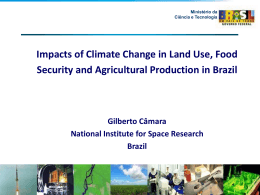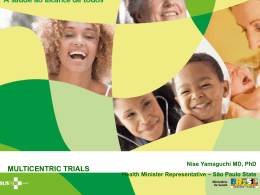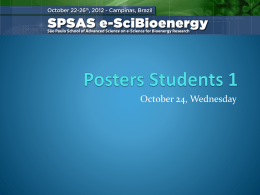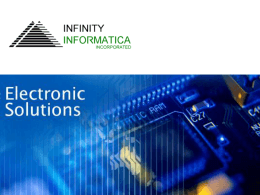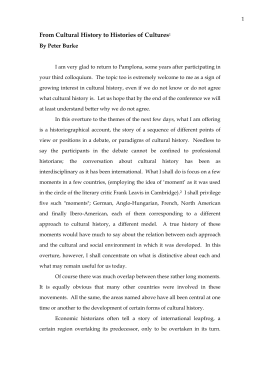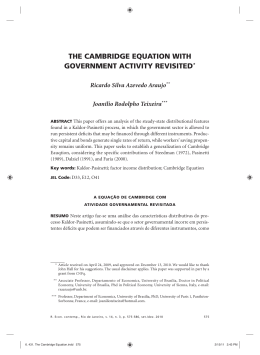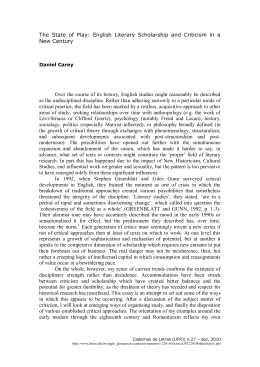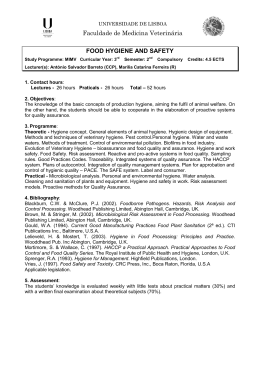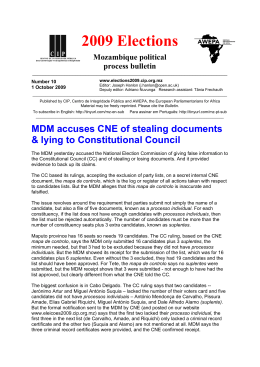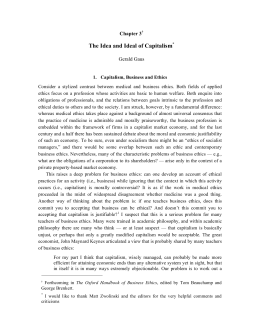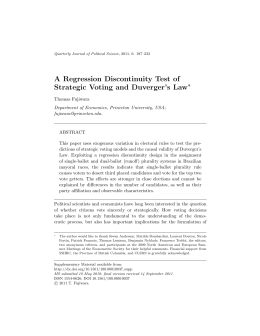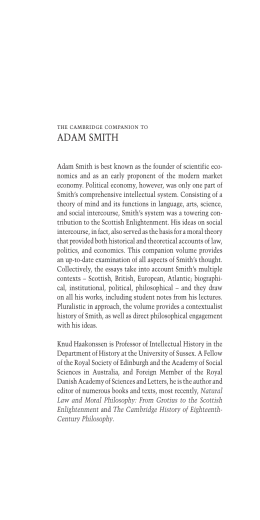Cambridge University Press 978-0-521-51455-2 - The Transformation of the Workers’ Party in Brazil, 1989-2009 Wendy Hunter Frontmatter More information The Transformation of the Workers’ Party in Brazil, 1989–2009 Drawing on historical institutionalism and strategic frameworks, this book analyzes the evolution of the Workers’ Party between 1989, the year of Lula’s first presidential bid, and 2009, when his second presidential term entered its final stretch. The book’s primary purpose is to understand why and how the once-radical Partido dos Trabalhadores (PT) moderated the programmatic positions it endorsed and adopted other aspects of a more catchall electoral strategy, thereby increasing its electoral appeal. At the same time, the book seeks to shed light on why some of the PT’s distinctive normative commitments and organizational practices have endured in the face of adaptations aimed at expanding the party’s vote share. The conclusion asks whether, in the face of these changes and continuities, the PT can still be considered a mass organized party of the left. Wendy Hunter is Associate Professor of Government at the University of Texas, Austin. Her early work focused on Latin American militaries during the transition from authoritarian rule. A second phase of her research career was devoted to social policy decision making and human capital formation in Latin America. Recently, she has been engaged in understanding the growth and transformation of the Workers’ Party in Brazil from 1989 until the present. She is the author of Eroding Military Influence in Brazil, and her articles have appeared in Comparative Politics, Comparative Political Studies, Political Science Quarterly, American Political Science Review, American Journal of Political Science, Journal of Democracy, and World Politics. She earned her doctorate from the University of California at Berkeley. © in this web service Cambridge University Press www.cambridge.org Cambridge University Press 978-0-521-51455-2 - The Transformation of the Workers’ Party in Brazil, 1989-2009 Wendy Hunter Frontmatter More information The Transformation of the Workers’ Party in Brazil, 1989–2009 WENDY HUNTER University of Texas, Austin © in this web service Cambridge University Press www.cambridge.org Cambridge University Press 978-0-521-51455-2 - The Transformation of the Workers’ Party in Brazil, 1989-2009 Wendy Hunter Frontmatter More information cambridge university press Cambridge, New York, Melbourne, Madrid, Cape Town, Singapore, São Paulo, Delhi, Dubai, Tokyo, Mexico City Cambridge University Press 32 Avenue of the Americas, New York, ny 10013-2473, usa www.cambridge.org Information on this title: www.cambridge.org/9780521733007 C Wendy Hunter 2010 This publication is in copyright. Subject to statutory exception and to the provisions of relevant collective licensing agreements, no reproduction of any part may take place without the written permission of Cambridge University Press. First published 2010 Printed in the United States of America A catalog record for this publication is available from the British Library. Library of Congress Cataloging in Publication data Hunter, Wendy. The transformation of the Workers’ Party in Brazil, 1989–2009 / Wendy Hunter. p. cm. Includes bibliographical references and index. isbn 978-0-521-51455-2 (hardback) – isbn 978-0-521-73300-7 (pbk.) 1. Partido dos Trabalhadores (Brazil) 2. Brazil – Politics and government – 2002– I. Title. jl2498.t7h86 2010 324.281 07–dc22 2010033070 isbn 978-0-521-51455-2 Hardback isbn 978-0-521-73300-7 Paperback Cambridge University Press has no responsibility for the persistence or accuracy of urls for external or third-party Internet Web sites referred to in this publication and does not guarantee that any content on such Web sites is, or will remain, accurate or appropriate. © in this web service Cambridge University Press www.cambridge.org Cambridge University Press 978-0-521-51455-2 - The Transformation of the Workers’ Party in Brazil, 1989-2009 Wendy Hunter Frontmatter More information Contents Tables, Charts, and Figure in Text Tables and Chart in the Appendix Acronyms Acknowledgments 1 2 3 4 5 6 7 Introduction: Understanding the Normalization of the Workers’ Party Strategic Change or Organizational Persistence? Evolution of the Workers’ Party Opposition Politics: The PT in the Chamber of Deputies The PT in Municipal Government: The Pragmatic Face of the Party Striving for the Presidency: From Opposition to Government New Challenges and Opportunities: The PT in Government, 2003–2009 Analytical Implications and Comparative Perspectives page vi vii ix xiii 1 13 45 79 106 146 177 Appendix References Interviews 201 211 229 Index 231 v © in this web service Cambridge University Press www.cambridge.org Cambridge University Press 978-0-521-51455-2 - The Transformation of the Workers’ Party in Brazil, 1989-2009 Wendy Hunter Frontmatter More information Tables, Charts, and Figure in Text tables 3.1. Ideological Blocs in the Chamber of Deputies: 1982–2006 5.1. Regional Breakdown of Second-Round Presidential Election Results: 1989 versus 2002 6.1. Regional Breakdown of Second-Round Presidential Election Results: 1989, 2002, and 2006 page 48 141 170 charts 3.1. Growth of the PT in the Chamber of Deputies, 1982–2006 3.2. Percentage of party label votes for principal parties in lower house elections, 1990–2006 4.1. Mayoral PT wins by region, 1988–2008 4.2. Mayoral PT wins by city size, 1988–2008 6.1. Evolution of vote shares by region: Lula vs. the PT 47 59 82 82 172 figure 3.1. Brazil’s political landscape, 1989–2002 53 vi © in this web service Cambridge University Press www.cambridge.org Cambridge University Press 978-0-521-51455-2 - The Transformation of the Workers’ Party in Brazil, 1989-2009 Wendy Hunter Frontmatter More information Tables and Chart in the Appendix tables A.1. A.2. A.3. A.4. A.5. A.6. A.7. A.8. Lula’s Record in Presidential Elections: 1989–2006 Congressional Election Results: 1982–2006 Municipal Election Results: 1982–2008 PT Mayoral Victories by Region and City Size: 1988–2008 Presidential Vote Intentions by Education Level: 1989–2006 Presidential Vote Intentions by Income Level: 1989–2006 Presidential Vote Intentions by City Size: 1994–2006 Cabinet Distribution among Coalition Members: The Cardoso and Lula Administrations Compared page 201 202 202 203 204 205 206 207 chart A.1. Evolution of Party Preferences: 1988–2006 210 vii © in this web service Cambridge University Press www.cambridge.org Cambridge University Press 978-0-521-51455-2 - The Transformation of the Workers’ Party in Brazil, 1989-2009 Wendy Hunter Frontmatter More information Acronyms ABC region: A = Santo André, B = São Bernardo do Campo, C = São Caetano do Sul AD: Acción Democrática, Democratic Action (Venezuela) APRA: Alianza Popular Revolucionaria Americana, American Popular Revolutionary Alliance (Peru) ARENA: Aliança de Renovação Nacional, National Renovating Alliance BF: Bolsa Famı́lia, Family Stipend BNDES: Banco Nacional de Desenvolvimento Econômico e Social, Brazilian Social and Economic Development Bank CDES: Conselho de Desenvolvimento Econômico e Social, Council of Economic and Social Development CNI: Confederação Nacional da Indústria, National Confederation of Industry CNT: Confederação Nacional do Transporte, National Confederation of Transportation COPEI: Comité de Organización Polı́tica Electoral Independiente, Social Christian Party of Venezuela CPI: Comissão Parlamentar de Inquérito, Parliamentary Investigatory Committee CUT: Central Única dos Trabalhadores, Unified Workers’ Confederation CVRD: Companhia Vale do Rio Doce DF: Distrito Federal, Federal District (Brası́lia) DIAP: Departamento Intersindical de Assessoria Parlamentar, InterUnion Department of Parliamentary Assistance ix © in this web service Cambridge University Press www.cambridge.org Cambridge University Press 978-0-521-51455-2 - The Transformation of the Workers’ Party in Brazil, 1989-2009 Wendy Hunter Frontmatter More information x Acronyms EMBRAPA: Empresa Brasileira de Pesquisa Agropecuária, Brazilian Company of Agribusiness Research FA: Frente Amplio, Broad Front (Uruguay) FARC: Fuerzas Armadas Revolucionarias de Colombia, Revolutionary Armed Forces of Colombia FHC: Fernando Henrique Cardoso FIESP: Federação das Industrias do Estado de São Paulo, Federation of Industries of the State of São Paulo FPA: Fundação Perseu Abramo, Perseu Abramo Foundation FREPASO: Frente por un Paı́s Solidario, Front for a Country in Solidarity (Argentina) FTAA: Free Trade Area of the Americas IBAMA: Instituto Brasileiro do Meio Ambiente e dos Recursos Naturais Renováveis, Brazilian Institute of Environment and Renewable Natural Resources IBGE: Instituto Brasileiro de Geografia e Estatı́stica, Brazilian Institute of Geography and Statistics IBOPE: Instituto Brasileiro de Opinião Pública e Estatı́stica, Brazilian Institute of Public Opinion and Statistics IC: Instituto Cidadania, Citizenship Institute IDB: Inter-American Development Bank IDESP: Instituto de Estudos Econômicos, Sociais, e Polı́ticos de São Paulo, São Paulo Institute for Economic, Social, and Political Studies IMF: International Monetary Fund INCRA: Instituto Nacional de Colonização e Reforma Agrária, National Institute of Colonization and Land Reform IPTU: Imposto Predial e Territorial Urbano, Urban Property and Building Tax ISI: Import Substitution Industrialization IU: Izquierda Unida, United Left (Peru) LCR: La Causa R, The Radical Cause (Venezuela) MERCOSUL: Mercado Comum do Sul, Southern Common Market MDS: Ministério do Desenvolvimento Social, Ministry of Social Development MST: Movimento dos Trabalhadores Rurais Sem Terra, Movement of Landless Rural Workers PAN: Partido Acción Nacional, National Action Party (Mexico) PCB: Partido Comunista Brasileiro, Brazilian Communist Party © in this web service Cambridge University Press www.cambridge.org Cambridge University Press 978-0-521-51455-2 - The Transformation of the Workers’ Party in Brazil, 1989-2009 Wendy Hunter Frontmatter More information Acronyms xi PCdoB: Partido Comunista do Brasil, Communist Party of Brazil PDS: Partido Democrático Social, Democratic Social Party PDT: Partido Democrático Trabalhista, Democratic Labor Party PDVSA: Petróleos de Venezuela, S.A. PED: Processo de Eleições Diretas, Process of Direct Elections PFL: Partido da Frente Liberal, Party of the Liberal Front PJ: Partido Justicialista, Justicialist Party (Argentina) PL: Partido Liberal, Liberal Party PMDB: Partido do Movimento Democrático Brasileiro, Party of the Brazilian Democratic Movement PMN: Partido da Mobilização Nacional, Party of National Mobilization PPA: Plano Plurianual, Multiyear Plan PPB: Partido Progressista Brasileiro, Brazilian Progressive Party PPR: Partido Progressista Renovador, Reformist Progressive Party PPS: Partido Popular Socialista, Popular Socialist Party PRD: Partido de la Revolución Democrática, Party of the Democratic Revolution (Mexico) PRI: Partido Revolucionario Institucional, Institutional Revolutionary Party (Mexico) PRN: Partido da Reconstrução Nacional, Party of National Reconstruction PRONA: Partido da Reedificação da Ordem Nacional, National Order Reconstruction Party PRP: Partido Republicano Progressista, Progressive Republican Party PSB: Partido Socialista Brasileiro, Brazilian Socialist Party PSDB: Partido da Social Democracia Brasileira, Party of Brazilian Social Democracy PSOE: Partido Socialista Obrero Español, Spanish Socialist Workers’ Party PSOL: Partido Socialismo e Liberdade, Party for Socialism and Liberty PST: Partido Social Trabalhista, Social Labor Party PSTU: Partido Socialista dos Trabalhadores Unificado, Unified Socialist Workers’ Party PT: Partido dos Trabalhadores, Workers’ Party PTB: Partido Trabalhista Brasileiro, Brazilian Labor Party PUM Partido Unificado Mariateguista, Unified Mariateguista Party (Peru) PV: Partido Verde, Green Party SMs: salários minimos, minimum wage levels © in this web service Cambridge University Press www.cambridge.org Cambridge University Press 978-0-521-51455-2 - The Transformation of the Workers’ Party in Brazil, 1989-2009 Wendy Hunter Frontmatter More information xii Acronyms STF: Supremo Tribunal Federal, Supreme Court TSE: Tribunal Superior Eleitoral, Supreme Electoral Court UAMPA: União das Associações de Moradores de Porto Alegre, Union of Neighborhood Associations of Porto Alegre WTO: World Trade Organization © in this web service Cambridge University Press www.cambridge.org Cambridge University Press 978-0-521-51455-2 - The Transformation of the Workers’ Party in Brazil, 1989-2009 Wendy Hunter Frontmatter More information Acknowledgments I have incurred many debts in the process of researching and writing this book. I am glad to finally be able to acknowledge all of the individuals and institutions that helped me along the way. It is my pride and pleasure to be a faculty member of the Department of Government at the University of Texas. An extraordinary group of colleagues – Dan Brinks, Henry Dietz, Zach Elkins, Ken Greene, Juliet Hooker, Raúl Madrid, and Kurt Weyland – provided invaluable feedback on various parts of the manuscript. In particular, I would like to thank Ken Greene for his insights on the political parties literature, Raúl Madrid for his sound advice and supportive feedback over the years, and Kurt Weyland for reading and commenting on the whole manuscript. A string of talented, dedicated, and good-humored research assistants – Daniel Nogueira Budny, Juliana Estrella, Rodrigo Nunes, Natasha Borges Sugiyama, Jeremy Teigen, and Kristin Wylie – contributed invaluably to the book. I will always be grateful to them. Chairs Gary Freeman and John Higley, together with LLILAS director Bryan Roberts, supported the leaves from teaching that were so crucial to research and writing. I thank the College of Liberal Arts and the Teresa Lozano Long Institute of Latin American Studies at the University of Texas for their financial assistance in this regard. I acknowledge as well the Andrew W. Mellon Foundation for the research trips that it funded. A year-long residential fellowship at the Kellogg Institute of International Studies at the University of Notre Dame was decisive in getting this project off the ground. I am deeply grateful to Scott Mainwaring for his xiii © in this web service Cambridge University Press www.cambridge.org Cambridge University Press 978-0-521-51455-2 - The Transformation of the Workers’ Party in Brazil, 1989-2009 Wendy Hunter Frontmatter More information xiv Acknowledgments support in that critical year and for his various contributions since then. Thanks are due also to Michael Coppedge for the many useful suggestions he provided. My enduring friendship with Frances Hagopian, one of the most incisive thinkers I know, helped sustain me during the many years it took to complete this project. Special recognition goes to Steven Levitsky, whose extensive and intelligent comments enhanced the book. I have also benefited from contact with Timothy Power, whose knowledge and understanding of Brazilian politics knows no rival. I deeply value the professional relationship and personal friendship we have maintained since meeting in Brazil as graduate students in 1989, the year of Lula’s first presidential bid. I would also like to acknowledge David Samuels for the impressive work he has done on the Workers’ Party and his generosity in sharing it with me. Warm thanks go to David Fleischer, who for years has supplied me with relevant news stories and directed my attention to issues and events in Brazilian politics that would have escaped my attention otherwise. Similarly, I tip my hat to Andrew Stein for his incredible ability to stay on top of current developments in Brazil and the region at large, and I thank him for taking the time to point out relevant news items to me. Three young talented Brazilian scholars were crucial in helping my research get started: Oswaldo Amaral, Paulo Roberto Figueira Leal, and Celso Roma. I am very appreciative of their generous and patient assistance. Recognition also goes to Leo Avritzer, Barry Ames, Octavio Amorim Neto, Andy Baker, David Collier, Peter Kingstone, Rachel Meneguello, Mala Htun, Gaby Ondetti, Jim McGuire, Ken Roberts, Bill Smith, and Brian Wampler. I would like to thank editor Lewis Bateman for his interest in the book and for his role in ushering it through to completion. My debts closer to home are deep, many, and varied. My parents – James and Setsuko Hunter – continue to support my pursuits. Their main contribution in this round involved assuming childcare responsibilities. Anyone who has ever tried to attend a professional conference with two young children in tow knows the value of such help. My sons, Nikolas and Andreas Weyland, filled my life with joy during the years I wrote this book. Their playfulness and ability to enjoy life as though there were no tomorrow provided relief when energy and enthusiasm lagged. Their miraculous development gave me the fortitude to get back up and resume working. © in this web service Cambridge University Press www.cambridge.org Cambridge University Press 978-0-521-51455-2 - The Transformation of the Workers’ Party in Brazil, 1989-2009 Wendy Hunter Frontmatter More information Acknowledgments xv My debt to Kurt Weyland is without parallel. His sharp theoretical insights, profound knowledge of Brazil, and persistent intellectual questioning helped greatly on the professional front. His loving dedication to our children and ability to deal tirelessly with the endless tasks of managing a household contributed crucially on the home front. With love and gratitude, I dedicate this book to Niko, Andi, and Kurt. © in this web service Cambridge University Press www.cambridge.org
Download
